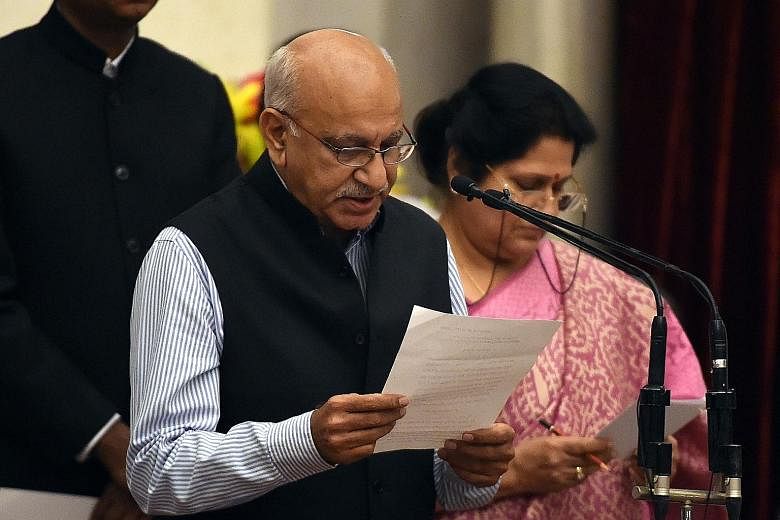NEW DELHI • An Indian government minister has resigned, saying he was doing so in order to fight accusations of sexual harassment levelled by more than a dozen women, the most high-profile casualty of a growing #MeToo movement.
The women have accused Mr M.J. Akbar, a junior foreign minister, of a range of inappropriate behaviour during his career as a journalist before entering politics.
He has denied the accusations and filed a criminal lawsuit against one of the women for defaming him.
"Since I have decided to seek justice in a court of law in my personal capacity, I deem it appropriate to step down from office and challenge false accusations levied against me in a personal capacity," Mr Akbar said in a statement yesterday.
The #MeToo movement, which began in the United States more than a year ago in response to accusations of sexual harassment and abuse by powerful men in the entertainment industry, gained traction in India late last month after actress Tanushree Dutta said actor Nana Patekar behaved inappropriately on the sets of a film they were shooting in 2008.
Mr Patekar has denied any wrongdoing.
Since then, more than a dozen men in the media, entertainment, political and art worlds have been accused of offences, ranging from sexual harassment to rape.
"As women, we feel vindicated by M.J. Akbar's resignation. I look forward to the day when I will also get justice in court," journalist Priya Ramani, who was the first to accuse Mr Akbar, said in a Twitter post.
Mr Akbar, 67, has filed a defamation suit against her.
India is a conservative country and discussion of sex is taboo for many people. Women have long lagged behind men in workplace participation.
"Eventually the truth prevails," Ms Ghazala Wahab, another journalist who accused Mr Akbar of making physical advances, told CNN NEWS 18.
Mr Akbar was a prominent editor who founded several publications including the Asian Age.
He was overseas when the allegations emerged and upon his return vowed to fight them.
Women's groups and journalists' associations have demanded that Prime Minister Narendra Modi act against him.
Mr Modi's Hindu nationalist government has said very little about the accusations against one of its members or about the upsurge in #MeToo allegations.
Mr Ramdas Athawale, junior minister for social justice, said he supported Mr Akbar's decision to quit.
"The allegations against him should be properly investigated," Mr Athawale said.
The opposition Congress had also been relatively muted in its criticism of the government over the allegations against Mr Akbar. This week, the chief of its youth wing stepped down after a woman party member alleged harassment.
Dr Sandeep Shastri, a political analyst at Jain University in the city of Bengaluru, said Mr Akbar's defamation lawsuit and his subsequent resignation could indicate damage limitation by the government.
"You are facing an election in several states and this could have been highly embarrassing for the government. It would have been tough for the government to justify retaining him," said Dr Shastri.
"I won't be surprised if he was asked to resign".
REUTERS

